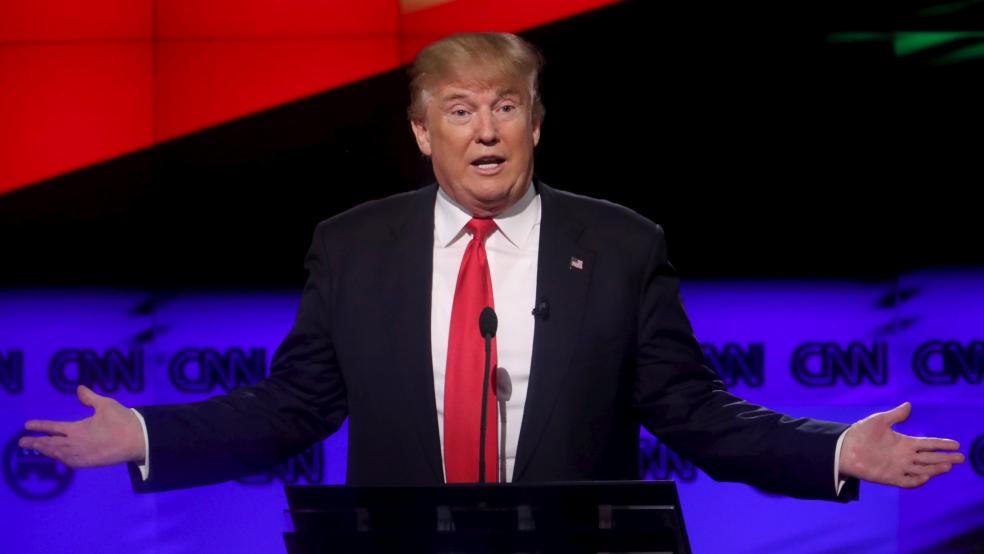The number of foreign policy experts worried about Donald Trump’s views is threatening to grow from a trickle into a flood.
The origin of the anxiety can be traced back to last summer, soon after the billionaire announced his White House bid, when he took a hardline on immigration, including erecting 2,000-mile long U.S.-Mexico border – that he claims Mexico would pay for – and evolved into initiating a temporary ban on Muslims from entering America.
Related: Ex-Trump Insider: Donald Doesn’t Want to Be President
The latter proposal drew international criticism from leaders like British Prime Minister David Cameron.
“I think his remarks are divisive, stupid and wrong, and I think if he came to this country it would unite us all against him,” Cameron, a member of the Conservative Party, said during Question Time in the House of Commons late last year.
That was then. Now, the number of people who realize that Trump could actually win the Republican nomination has caused a mass anxiety attack. Recent editorial board meetings with both The Washington Post and The New York Times, where the former reality TV star laid out a world view based on a strategy of “unpredictability,” like withdrawing the U.S. from NATO, halting the purchase of oil from Saudi Arabia and allowing Japan and South Korea to have nuclear weapons, raised more eyebrows.
It raised alarms across the civilized world.
Related: Ex-Trump Insider: Donald Doesn’t Want to Be President
Besides Cameron, Here’s what people are saying about Trump’s foreign policy positions:
- “Virtually every foreign leader that [Secretary of State John Kerry] meets with expresses concerns about the campaign rhetoric here in the United States, and expresses a fair bit of angst about where things are going,” State Department spokesman John Kirby said Monday. “The very stark rhetoric that continues to emerge from the campaign is not being ignored by foreign leaders and foreign governments and foreign populations,” he added.
- “It’s not so much wrong or overly certain. It’s incoherent,” former CIA chief Michael Hayden, who served in the George W. Bush administration, told Politico. “I view his [Trump’s] current statements as erratic… I just don’t know what it is he’s going to do,” Hayden added.
- “He cannot stick to a subject, it is remarkable. And when he doesn’t know something, he just changes the subject, makes it all about himself,” Andrea Mitchell, NBC News Chief Foreign Affairs Correspondent and anchor, said Sunday on Meet the Press. Trump “would cancel defense treaties with Japan and South Korea against North Korea. … He would be okay if Japan and South Korea go nuclear. American policy for decades since World War II has been trying to keep nukes out of that arena. He would stop importing oil from Saudi Arabia if they don't pay more for their defense. We need oil. We are not energy-independent. We rely on oil still for our daily needs.
“He is completely all over the lot on Iran. … He complained that Iran isn't buying our planes. It had to be pointed out to him that Iran is still under sanctions and cannot buy American planes. He thinks North Korea and Iran are the biggest trading partners when North Korea's biggest trading partner is China. He is completely uneducated about any part of the world,” she said.
Related: Why a Trump Candidacy Threatens the GOP Majority in Congress
- “He raised some serious questions about the U.S. and NATO. I share some of those questions,” Sen. Tom Cotton (R-AR), a member of the Armed Services Committee, told MSNBC on Friday. “We used to split our costs 50-50 between the U.S. and Europe. Today it’s 70-30 between the U.S. and Europe. I would have a different approach.
“Rather than reducing our spending on what is a critical national security alliance, I would urge European leaders to increase their spending specifically so we can stop the kind of terrorist attacks we’ve seen in Paris and Brussels.”
- “Scary. That’s how we view Trump,” one foreign ambassador told The Washington Post last week. “Could we depend on the United States? We don’t know. I can’t tell you how the unpredictability we are seeing scares us.”
- “In the past when candidates said extreme things, there always has been some seasoned, experienced adviser you could talk to, or who would speak out to soften what was said. This is not the case with Trump,” said an ambassador from South America.
Related: For Now, Democrats Savor a Clinton-Trump Matchup this Fall
- “We had such appreciation for your system when Barack Hussein Obama was elected,” according to one Middle Eastern diplomat. “Hussein was his middle name. Hussein! He was black. We so admired that America could do something like that. Now you have a candidate who doesn’t want Muslims.”
- “His vision of American influence and power in the world is wildly inconsistent and unmoored in principle. He swings from isolationism to military adventurism within the space of one sentence,” wrote several dozen GOP foreign policy experts in a March 2 letter.
- Max Boot, Council on Foreign Relations fellow, said, “I would sooner vote for Josef Stalin than I would vote for Donald Trump,” Boot told The New York Times on March 2. “There is no way in hell I would vote for him. I would far more readily support Hillary Clinton or Bloomberg if he ran.”





